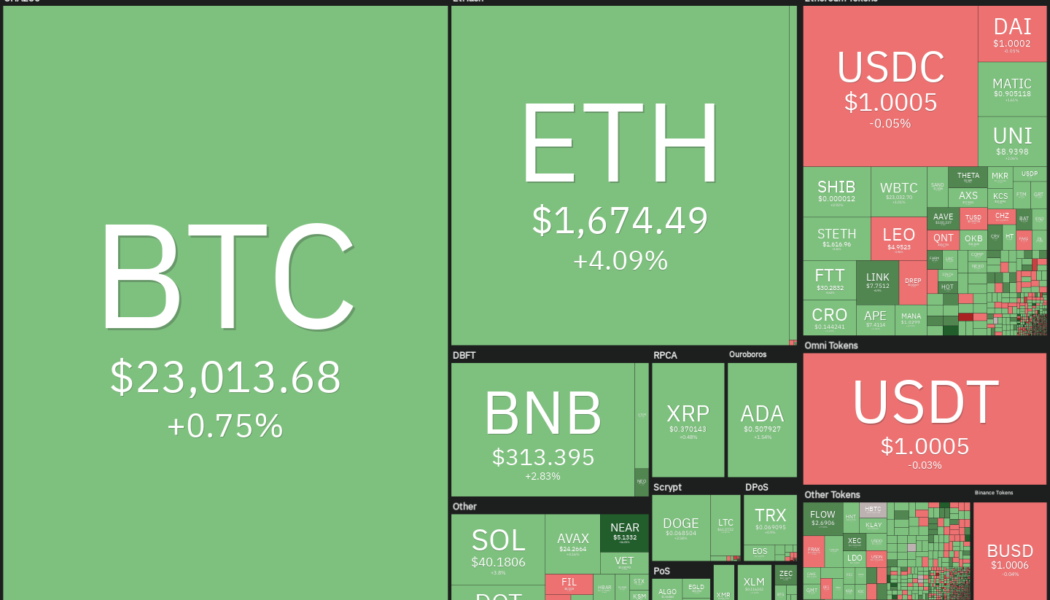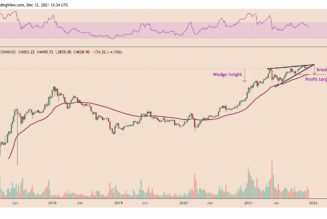The United States Labor market added 528,000 jobs in July, much better than the 258,000 estimate. Wages saw growth of 5.2% year-over-year and 0.5% over the month. This suggests that inflation remains high and the U.S. Federal Reserve may continue with its rate hikes in the near future.
After staying in close correlation with the U.S. equities markets for the past several months, the crypto space could be ready to chalk out a new course.
Bloomberg Intelligence senior commodity strategist Mike McGlone and senior market structure analyst Jamie Coutts said in a recent report that Bitcoin (BTC) has started base building similar to the one seen near $5,000 in 2018–2019. They expect the recovery to decouple from stocks and behave more like U.S. “Treasury bonds or gold.”

Although crypto prices have plunged sharply during the ongoing bear market, it has not dented investors’ appetite. A report by crypto analytics firm Messari and Dove Metrics showed that the crypto space raised $30.3 billion in funds in 2022, surpassing the total amount raised in 2021.
Could Bitcoin continue its recovery or will bears pose a strong challenge at higher levels? Let’s study the charts of the top-10 cryptocurrencies to find out.
BTC/USDT
The bears pulled the price below the 20-day exponential moving average (EMA) ($22,630) on Aug. 4 but could not sustain the lower levels. This indicates that the bulls are defending the level aggressively.

The gradually up-sloping 20-day EMA and the relative strength index (RSI) in the positive territory indicate a minor advantage to buyers. If the price rises off the 20-day EMA, the bulls will attempt to push the BTC/USDT pair to the overhead resistance at $24,668.
This is an important level to keep an eye on because if the price breaks above $24,668, the pair could pick up momentum and rally toward $28,000 and then on to $32,000. Such a move will suggest that the pair may have bottomed out.
Contrary to this assumption, if the price turns down from the current level or the overhead resistance and breaks below the 20-day EMA, it will suggest that bears continue to sell on minor rallies. That could open the doors for a drop to the 50-day simple moving average (SMA) ($21,388).
ETH/USDT
Ether (ETH) has been trading between the 20-day EMA ($1,560) and the $1,700 resistance for the past four days. Usually, tight range trading is followed by a range expansion.

The up-sloping 20-day EMA and the RSI in the positive zone indicate advantage to buyers. A break and close above the overhead resistance zone between $1,700 and $1,785 could open the doors for a possible rally to $2,000 and later to $2,200.
Alternatively, if the ETH/USDT pair turns down from the current level and breaks below the 20-day EMA, it will suggest that bears continue to defend the overhead zone with all their might. That could result in a decline to the strong support at $1,280.
BNB/USDT
BNB bounced off the $275 support on Aug. 2 and broke above the immediate resistance at $302 on Aug. 3. This indicates the resumption of the up-move.

The up-sloping 20-day EMA ($277) and the RSI in the overbought zone indicate that bulls are in command. The BNB/USDT pair could rally to the stiff overhead resistance at $350. This level is likely to attract strong selling from the bears.
To invalidate this bullish view, the bears will have to sink and sustain the price below the 20-day EMA. If that happens, short-term traders may rush to the exit and that could pull the pair down to the 50-day SMA ($246).
XRP/USDT
The buyers have successfully held the 20-day EMA ($0.36) support in the past few days but have failed to achieve a strong rebound in XRP. This suggests that bears are selling on rallies.

The XRP/USDT pair could remain stuck between the 20-day EMA and the overhead resistance zone between $0.39 and $0.41. If bulls clear the overhead hurdle, the positive momentum could pick up and the pair could rally to $0.48 and then to $0.54.
Alternatively, if the price turns down and breaks below the 20-day EMA, it will suggest that the demand has dried up. That could sink the pair to the 50-day SMA ($0.34) and keep the pair range-bound between $0.30 and $0.39 for a few more days.
ADA/USDT
The bears repeatedly tried to sink Cardano (ADA) below the 20-day EMA ($0.50) in the past three days but the bulls held their ground.

The ADA/USDT pair has rebounded off the 20-day EMA and the buyers will attempt to push the price above the overhead resistance at $0.55. If they manage to do that, the bullish momentum could pick up and the pair could rise to $0.63 and later toward $0.70.
Alternatively, if the price turns down from the overhead resistance, it will suggest that bears are active at higher levels. The sellers will then again attempt to sink the price below the moving averages and retain the pair inside the range between $0.40 and $0.55 for some more time.
SOL/USDT
The bears tried to sink the price below the support line on Aug. 3 but the bulls defended the level successfully. Solana (SOL) formed an inside-day candlestick pattern on Aug. 4, which resolved to the upside on Aug. 5.

If buyers sustain the price above the 20-day EMA ($40), the SOL/USDT pair could climb to $44 and then retest the stiff overhead resistance at $48. The bulls will have to clear this hurdle to signal the formation of an ascending triangle pattern. This bullish setup has a target objective of $71.
Contrary to this assumption, if the price turns down and breaks below the support line, the bullish setup will be invalidated. The pair could then slide toward the strong support at $31.
DOGE/USDT
Dogecoin (DOGE) bounced off the 50-day SMA ($0.07) on Aug. 4 and the bulls extended the up-move above the 20-day EMA ($0.07) on Aug. 5.

The bulls will attempt to push the price toward the overhead resistance at $0.08. This is an important level for the bears to defend because a break and close above it will complete an ascending triangle pattern. The DOGE/USDT pair could then start an up-move to $0.10 and then to the pattern target at $0.11.
On the other hand, if the price turns down from the current level and breaks below the 50-day SMA, it will suggest that bears are selling on rallies. The pair could then drop to the support line of the triangle. A break below this level could negate the bullish setup.
Related: Bitcoin fails to beat $23.4K sellers as US payrolls upend inflation debate
DOT/USDT
Polkadot (DOT) bounced off the 20-day EMA ($7.78) on Aug. 3, indicating demand at lower levels. The buyers will attempt to push the price to the overhead resistance zone between $9 and $9.21.

If bulls clear this overhead hurdle, the DOT/USDT pair could pick up momentum and start its northward march toward $10.80 and then $12. The up-sloping 20-day EMA and the RSI in the positive zone indicate that buyers are in control.
To invalidate this bullish view, the bears will have to sell aggressively and sink the pair below the moving averages. If that happens, the pair may remain stuck inside the range between $6 and $9 for some more time.
MATIC/USDT
The buyers have successfully held Polygon (MATIC) above the 20-day EMA ($0.85) during the correction, which suggests a change in sentiment from selling on rallies to buying on dips.

Both moving averages are sloping up and the RSI is in the positive territory, indicating advantage to buyers. If bulls thrust the price above the overhead resistance at $1.02, the MATIC/USDT pair could rally to $1.26 and then to $1.50.
Conversely, if the price turns down and breaks below the 20-day EMA, it will suggest that the pair may extend its stay inside the range between $0.75 and $1 for some more time. The sellers will gain the upper hand on a break below $0.75.
AVAX/USDT
Avalanche (AVAX) has bounced off the 20-day EMA ($22.86), indicating that bulls are buying the dips to this support.

The buyers will drive the price to the stiff overhead resistance at $26.38. The gradually up-sloping 20-day EMA and the RSI in the positive territory indicate advantage to buyers. If bulls push the price above $26.38, the AVAX/USDT pair will complete a bullish ascending triangle pattern. The pair could then rally to $33 and later to $38.
Contrary to this assumption, if the price turns down from the overhead resistance and breaks below the 20-day EMA, the pair could drop to the support line.
Market data is provided by HitBTC exchange.
The views and opinions expressed here are solely those of the author and do not necessarily reflect the views of Cointelegraph.com. Every investment and trading move involves risk, you should conduct your own research when making a decision.
 [flexi-common-toolbar] [flexi-form class=”flexi_form_style” title=”Submit to Flexi” name=”my_form” ajax=”true”][flexi-form-tag type=”post_title” class=”fl-input” title=”Title” value=”” required=”true”][flexi-form-tag type=”category” title=”Select category”][flexi-form-tag type=”tag” title=”Insert tag”][flexi-form-tag type=”article” class=”fl-textarea” title=”Description” ][flexi-form-tag type=”file” title=”Select file” required=”true”][flexi-form-tag type=”submit” name=”submit” value=”Submit Now”] [/flexi-form]
[flexi-common-toolbar] [flexi-form class=”flexi_form_style” title=”Submit to Flexi” name=”my_form” ajax=”true”][flexi-form-tag type=”post_title” class=”fl-input” title=”Title” value=”” required=”true”][flexi-form-tag type=”category” title=”Select category”][flexi-form-tag type=”tag” title=”Insert tag”][flexi-form-tag type=”article” class=”fl-textarea” title=”Description” ][flexi-form-tag type=”file” title=”Select file” required=”true”][flexi-form-tag type=”submit” name=”submit” value=”Submit Now”] [/flexi-form]










Tagged: Avalanche, Binance Coin, Bitcoin, Cardano, crypto blog, Crypto news, Dogecoin, Ethereum, Markets, Polkadot, polygon, Price analysis, Ripple, Solana